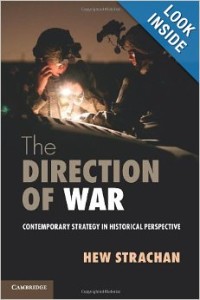
Hew Strachan
I love this book — absolutely required reading the war colleges as well as the civil service colleges. Perhaps its greatest value is in setting the stage for professionals to refuse illegal orders and begin the long hard process of ending the corruption of our Western elites, particularly those in the US and UK. The author is to be saluted for correcting Samuel Huntington's various mistakes of interpretation, and for generally finding a place for moral generals in the larger scheme of things.
HOWEVER the book misses the core point underlying modern war, which is that the imperial powers do not fight wars to win anything in particular, but rather to “use up” their militaries, reduce their population of angry young men, and foster opportunities for corruption among the elite and their particular servants (e.g. CIA revitalizing the Golden Triangle around Viet-Nam, and Afghan poppy production for Wall Street liquidity).
I think about strategy — and intelligence with integrity — a great deal. The conclusion I have come to, with some agreement from folks I respect such as Paul Pillar (Intelligence and U.S. Foreign Policy: Iraq, 9/11, and Misguided Reform), is that our political elite (speaking largely of US-UK and NATO) does not go to war on the basis of ethical evidence-based decision-support (my fighting words for the 21st century). They go to war because they want to, because, as Henry Kissinger is on record as saying, [Military men are] `dumb, stupid animals to be used' [as pawns for foreign policy]. This is the same man that said, to general laughter in the White House, “the illegal we do immediately, the unconstitutional takes a little longer.” As we now know in the case of Iraq, we went to war because Zionist Israel and the US neo-conservatives wanted to, the Texas oil and New York money cabal agreed, and the newspapers owned by five captive corporations were complicit in Dick Cheney's being able to lead the telling of 935 now-documented lies that liberated Iraq from Sunni minority control and took care of one of Iran's two real challengers. In short, the more I look into Viet-Nam and Iraq, the two major wars in our time, the more I see reliable evidence that the elite KNEW in advance they would “lose” the wars but win the profit — we would use up our military materiel, kill off or at least keep occupied the bulk of the angry dispossessed young men that might otherwise get out of hand on the streets, and enable trillion dollar looting schemes.
My key point: no matter how professional we might be at the craft of intelligence (see my chapter in Routledge Companion to Intelligence Studies), or even at the art of strategy, with Colin Gray being my persistent hero-mentor (see for instance my summary review of Modern Strategy), as long as we are burdened with a mix of financially and morally corrupt elites who are PROTECTED by the security agencies of state rather than held in check, no amount of professionalism will do.
Hence, for the professionals to do their job, and for strategy to matter, we first need to find a means of cleansing the stables. Counterintelligence must sit at the high table, and the middle ranks must do what they need to do to keep the upper ranks and the political mandarins accountable to the public. Whistleblowers are one path. “Ranger Justice” is another path. Saying no to illegal orders is a third path. We are just now entering a revolutionary period in which the 99% disenfranchise the 1%, and we professionals are caught in the middle. It is time for an internal war that stops all future external wars. IMHO.
Other books I especially recommend in this context:
Strategy: A History
Strategy for Chaos: Revolutions in Military Affairs and the Evidence of History (Strategy and History)
Lines of Fire: A Renegade Writes on Strategy, Intelligence, and Security
Full Spectrum Diplomacy and Grand Strategy: Reforming the Structure and Culture of U.S. Foreign Policy
Strategy: Process, Content, Context
Strategic Intelligence and Statecraft: Selected Essays (Brassey's Intelligence & National Security Library)
Who the Hell Are We Fighting?: The Story of Sam Adams and the Vietnam Intelligence Wars
Best wishes to all,
Robert David STEELE Vivas
INTELLIGENCE for EARTH: Clarity, Diversity, Integrity, & Sustainability




